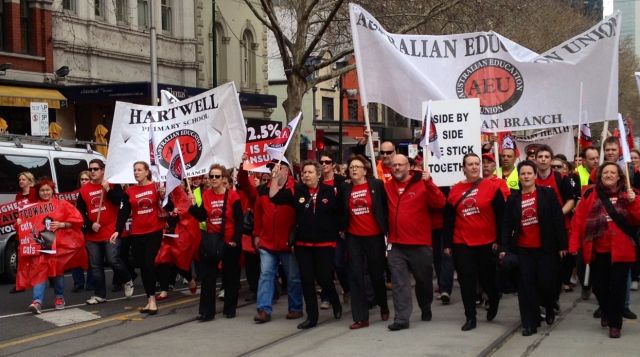
In mid-October, principals in Victorian public schools told their staff they had been instructed to identify underperforming teachers and education support staff (ES staff) by the end of that month.
These staff members would not immediately be told they were underperforming, but would only receive a letter in March next year informing them they would not receive a pay rise. Some staff might even be fast tracked out of the profession.
The government told principals that between 20% and 40% of staff were to be identified as underperforming.
It was strongly suggested that principals who did not comply would themselves be deemed as underperforming.
These are arbitrary figures the government has conceived without any evidence of their validity. Many have compared the idea to a teacher deciding that only 60% to 80% of their class will pass a test before the students have sat the test.
This attack on teachers comes at a time when many teachers are already under severe strain because some have been declared “in excess” — meaning that the school budget cannot pay for their salaries and that they are to be redeployed elsewhere. This also creates fear among remaining staff about who will be targeted next.
Under the proposed system, teachers and ES staff would be assessed according to a five-point scorecard. Student outcomes could account for up to 50% of a teacher’s score and school and student outcomes make up about 50% of principals’ scores.
This is performance pay by another name. Teachers and the education community have been fighting against the introduction of performance pay because it would undermine the collaborative nature of teaching.
The performance of students depends on factors beyond the ability of individual teachers. Each teacher builds on the work of other colleagues. Some students will not be engaged because they may have a difficult home life or they may be affected by large classes and lack of extra assistance.
The state government had first suggested such a system during the teacher and ES campaign for a new enterprise bargaining agreement (EBA) but the Australian Education Union (AEU) refused to include performance pay as part of their EBA.
Now that the EBA has been settled and the union is legally bound not to take industrial action, the state government is stealthily trying to introduce it.
This is an attack on the commitment and hard work of teachers. Public school teachers have to teach in large classes in often poorly resourced classrooms, which may also be in desperate need of repair.
Despite popular misconceptions, they work long hours, preparing and correcting student work in their own time or attending mandated professional development. The pay increments are a way of delaying young and new teachers and other education workers receiving their true salary.
In reality the government is looking to save money. This is another way to cut funding to government schools under the guise of improving teacher quality.
The AEU has taken the government to the Federal Court claiming that the Victorian government has contravened the EBA and the Fair Work Act by seeking to change a process that was agreed to when the EBA was settled and that it failed to consult with the union.
Court ordered mediation between the government and the AEU was unsuccessful. Consequently the Federal Court has been hearing the case on November 7 and 8.
The AEU rank-and-file group, Teachers & ES Alliance (TESA), organised a protest on the steps of the Victorian Parliament to coincide with the first day of the court case. About 20 teachers and ES staff took part.
[Mary Merkenich is an AEU state councillor and TESA member.]